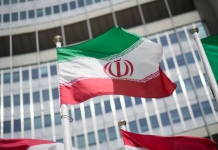——– G7 leaders also warned Iran about concluding a deal to send ballistic missiles to Russia
——– Approved aid for Ukraine
DM Monitoring
BARI: The Group of Seven leaders warned Iran on Friday against advancing its nuclear enrichment programme and said they would be ready to enforce new measures if Tehran were to transfer ballistic missiles to Russia, according to a draft communique.
“We urge Tehran to cease and reverse nuclear escalations, and stop the continuing uranium enrichment activities that have no credible civilian justifications,” the statement seen by Reuters said.
Iran has rapidly installed extra uranium-enriching centrifuges at its Fordow site and begun setting up others, a UN nuclear watchdog report said on Thursday.
Iran is now enriching uranium to up to 60% purity, close to the 90% of weapons grade, and has enough material enriched to that level, if enriched further, for three nuclear weapons, according to an IAEA yardstick.
“Iran must engage in serious dialogue and provide convincing assurances that its nuclear program is exclusively peaceful, in full cooperation and compliance with the IAEA’s monitoring and verification mechanism, including the Board of Governors’ resolution of 5 June,” the G7 said.
Iran says its nuclear programme is solely for peaceful purposes.
The leaders also warned Iran about concluding a deal to send ballistic missiles to Russia that would help it in its war against Ukraine, saying they were prepared to respond with significant measures if it were to happen.
“We call on Iran to stop assisting Russia’s war in Ukraine and not to transfer ballistic missiles and related technology, as this would represent a substantive material escalation and a direct threat to European security,” they said.
Earlier, Iran will change its nuclear doctrine if Israel threatens its existence, an adviser to Iran’s supreme leader said, the latest comment by an Iranian official that raises questions about what Tehran says is its peaceful nuclear program.
Tehran has always said it had no plans to obtain nuclear weapons. Western governments suspect that it wants nuclear technology to build a bomb; its nuclear program has been at the centre of a long-running dispute that has led to sanctions.
In April, in the middle of a tense standoff with Israel, which is widely believed to have nuclear weapons, a senior Iranian Revolutionary Guards commander also said Israeli threats could prompt Iran to change its nuclear doctrine.
“We have no decision to build a nuclear bomb but should Iran’s existence be threatened, there will be no choice but to change our military doctrine,” Kamal Kharrazi, an adviser to Supreme Leader Ayatollah Ali Khamenei, was reported as saying by Iran’s Student News Network on Thursday.
In 2022, the same adviser said Iran was technically capable of making a nuclear bomb but had not yet decided whether to build one.
Khamenei, who has the final say in Tehran’s nuclear program, banned the development of nuclear weapons in a fatwa, or religious edict, in the early 2000s.
He reiterated that in 2019, saying that building and stockpiling nuclear bombs was “wrong and using it is haram”, or religiously forbidden.
But Iran’s then-intelligence minister said in 2021 that Western pressure could push Tehran towards nuclear weapons.
In his latest comments, Kharrazi said: “In the case of an attack on our nuclear facilities by the Zionist regime, our deterrence will change,” using a term Iranian official use to refer to Israel.



